I recently finally fastened my suspenders, donned a tophat, and went back to Lies of P to actually commit to a proper, honest-to-Asimov playthrough. I had a great time with Round 8 Studio and Neowiz’s “puppet bloodborne”—not exceptional, but great.
Lies of P did a lot of things I liked, but showed its smaller scope on occasion, which is no crime. Overall, I found it to be a really solid entry into the genre: A couple of wobbles, a couple of great ideas, and basically congruent with our 74% review score. Then I played Overture, and buddy? I have been blown away: Flying backwards, ass-over teakettle, socks and shoes flung off my feet into the next block.
I broadly agree with our reviewer Lincoln Carpenter’s assessment of P’s base game—spotty localisation, occasionally-wonky balance, and random difficulty spikes jostled with my appreciation of some otherwise killer boss and environment design. Overture doesn’t have most of these problems.
It’s hard, like a good souls DLC ought to be, testing the fundamentals built up over two years of nose-growing and running you through the grinder. But otherwise? I felt like I was seeing Round 8 hit its stride. Lies of P’s base game was a studio showing it could run with the FromSoftware pack—meanwhile, Overture flies.
Ornstein & who?
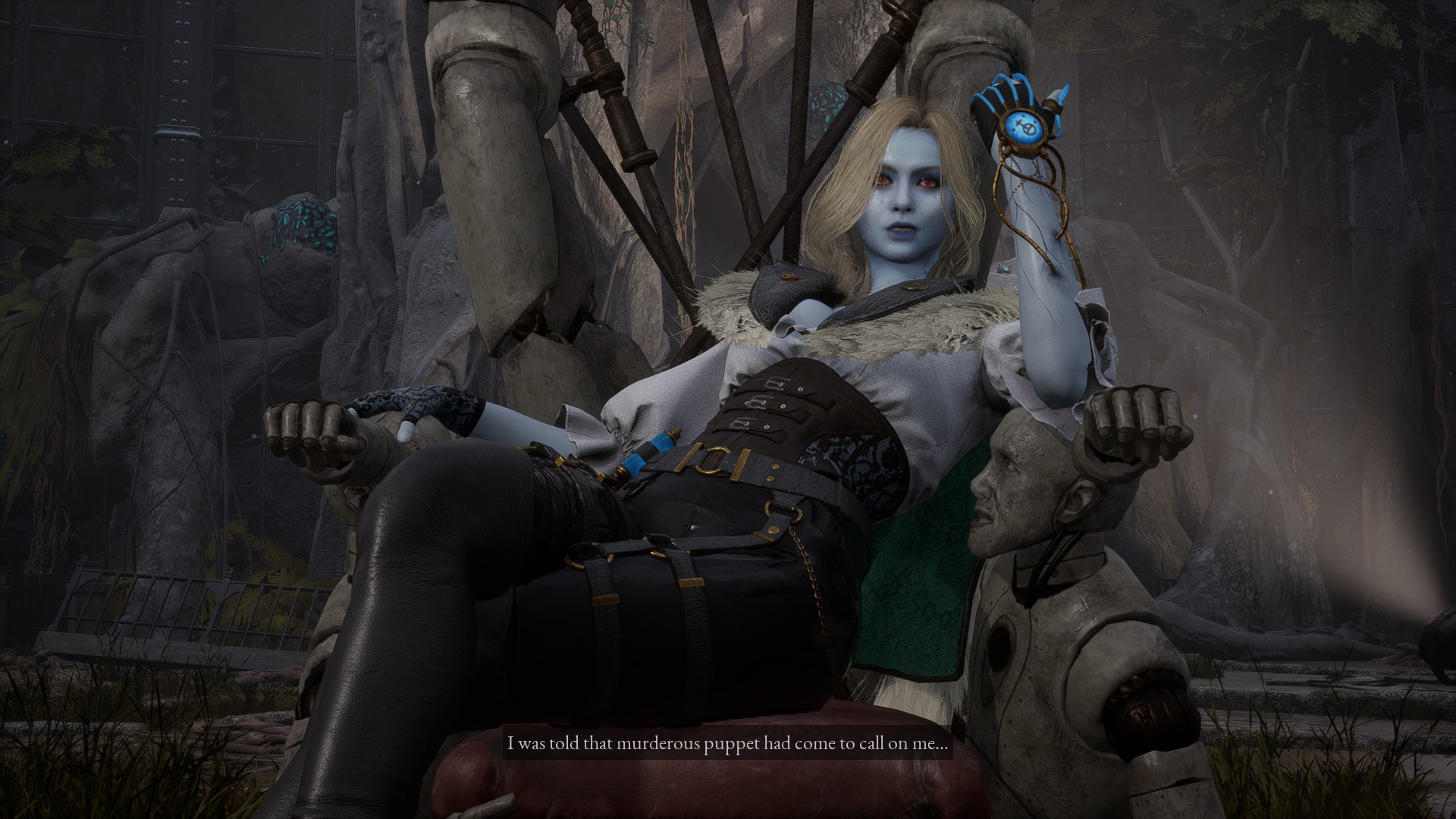
First-up, the souls of it all: Overture’s level design is just as solid as its base game typically is, but with the added benefit of Round 8 Studio getting to have some real fun with where it places you.
Gone are the Bloodborne-esque streets, replaced with, in no particular order: A ruined zoo full of infected kangaroos, bears, and one very angry crocodile; a gorgeous greenhouse teeming with angelic sci-fi puppets; a horrific asylum haunted by terrible experiments; and Shipwrecks amidst ice floats ripped straight from Mary Shelley’s Frankenstein. Overture is both more creative with its set-dressing, and altogether prettier.
And then there’s the bosses. It’s rare for me to get through a DLC for one of these games—whether it’s FromSoftware or a different studio—and think to myself ‘man, I enjoyed all of that’. But Overture basically nails it.
It’s nice that I can avoid deep spoilers, here, because the best example of this is the first boss you encounter: Markiona, Puppeteer of Death. Ornstein and Smough have officially been shoved into a locker, beaten up, and had their joint lunch money taken by Markiona and her puppet. Markiona is a duo fight in a soulslike game that doesn’t suck. They said it couldn’t be done? It can.
The trick is playing into the puppeteering theme. Markiona and her Queen’s Arche Puppet are joined by a thread of string. While her puppet is dangerous and agile, it can’t act unless it’s been controlled by her—and when she issues commands, the thread turns from blue to red.
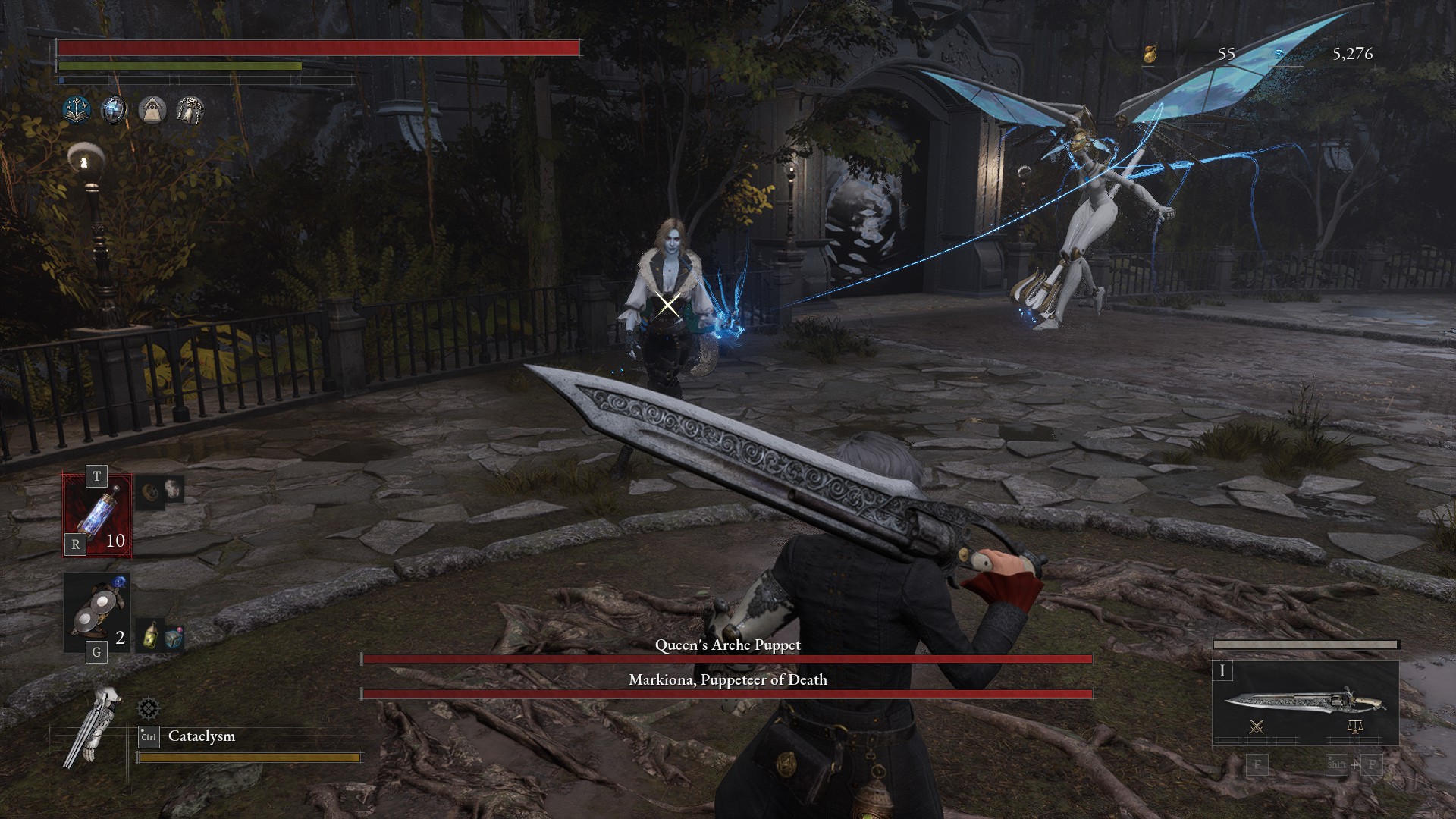
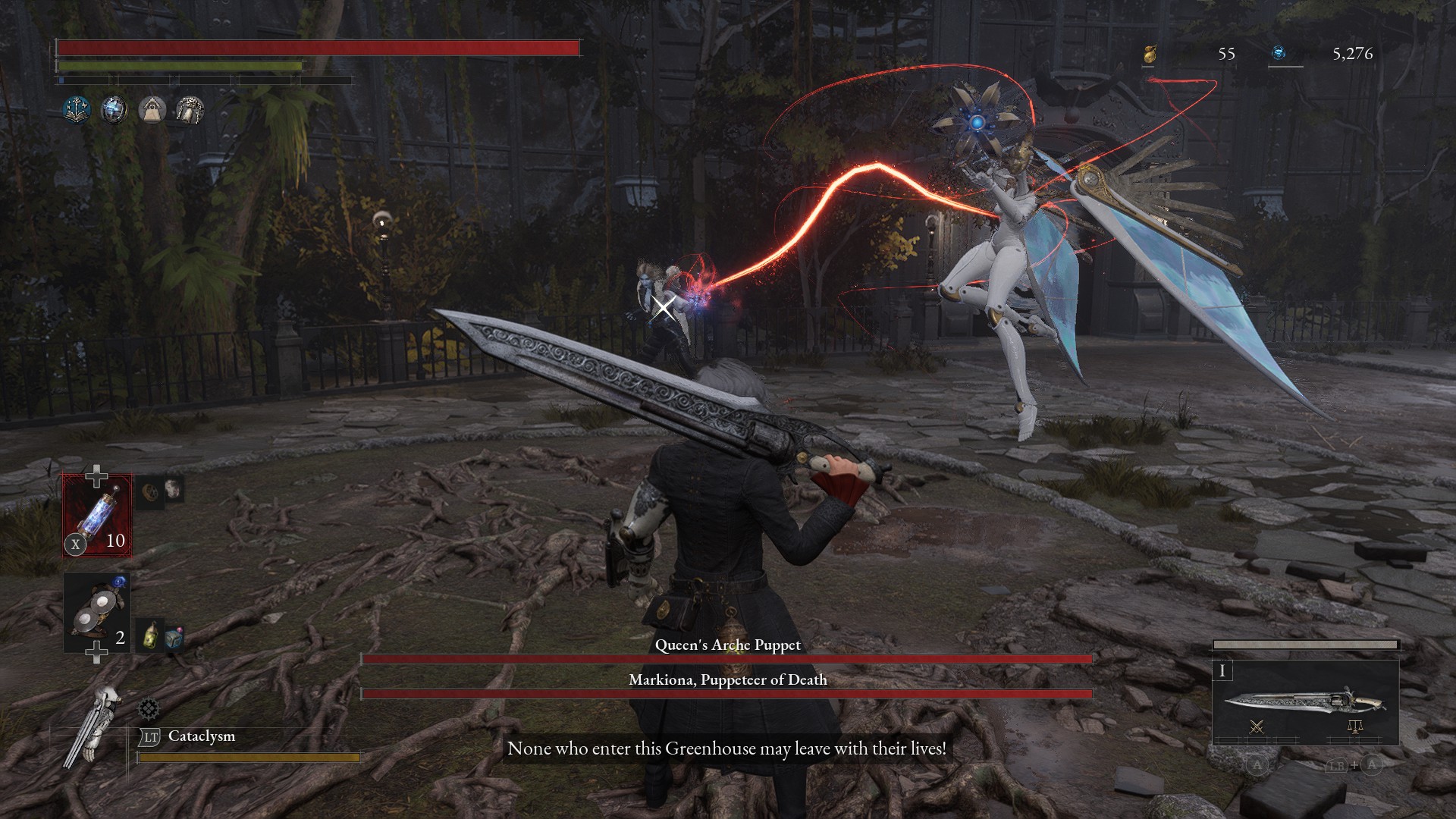
It’s such a simple, clever trick that means you’re almost never killed by an attack you didn’t see coming. You can focus on Markiona until the thread changes colour, then swap your lock-on to her puppet, drifting between your two foes in an elegant dance.
You’re also able to make interesting choices—the fight ends when Markiona dies, but you can disable her puppet for a time by knocking it out. This forces Markiona to spend a couple of seconds casting a regenerative spell on her aide, which is free damage, before allowing you a blessed minute of 1v1ing.
And yet, because the puppet regenerates back to full health eventually, you’re never encouraged to entirely focus on it over Markiona—this shifting set of priorities keeps the fight feeling fluid in a way that’s hard to encapsulate without getting your hands on a controller yourself (which I am writing this entire article to encourage you to do).
The rest of the DLC’s bosses are similarly ingenious. Even the “duel” fights with other Stalkers, which I found overwhelming in the base game, are memorable and well-executed. And it all culminates in a final boss that rivals Sekiro’s Isshin, Sword Saint in both spectacle and difficulty.
Speaking of spectacle, it’s where Overture differs from its inspiration that really sets it apart.
Just too late
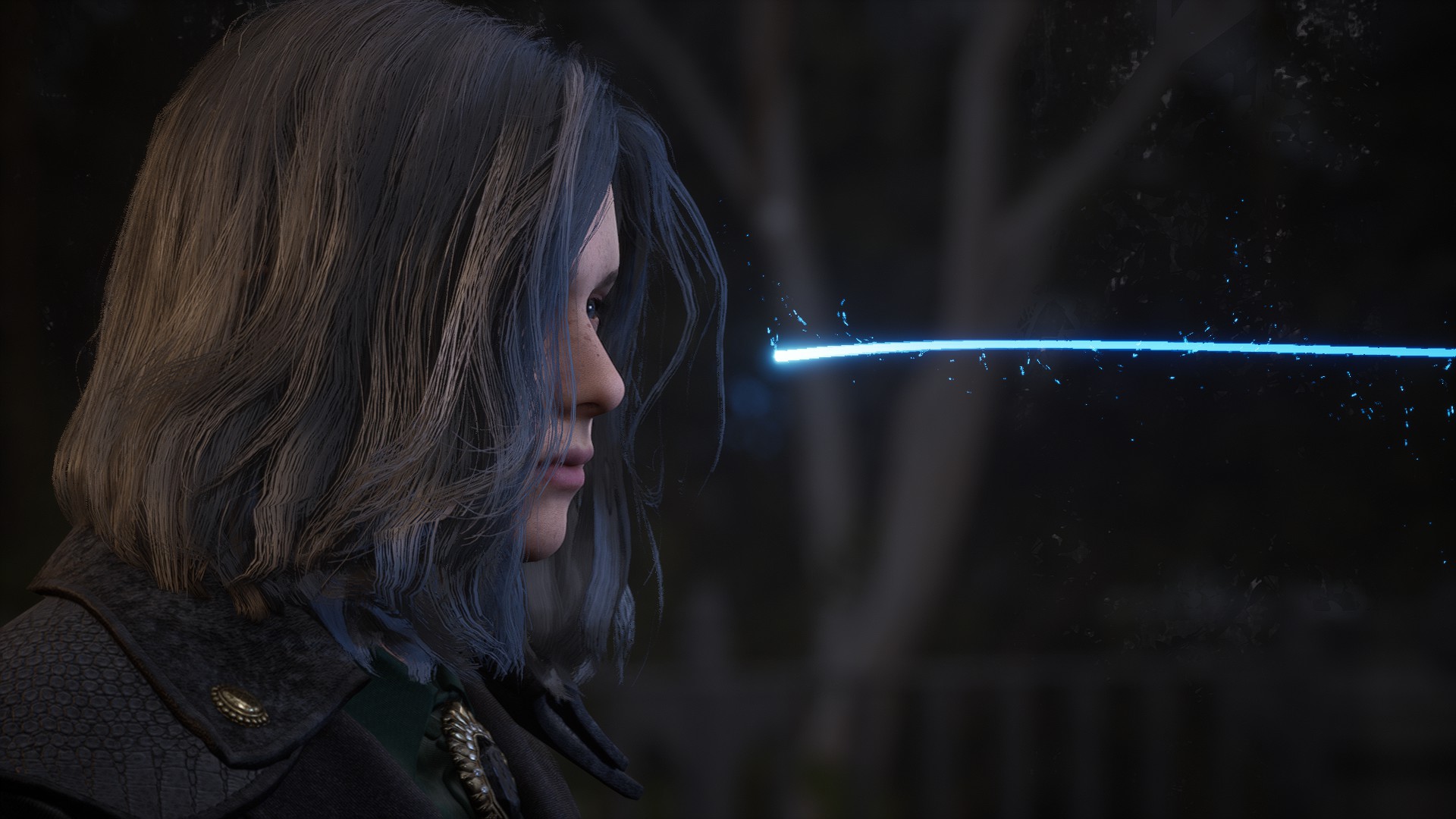
The basic jist of Overture is that you’re sent back in time before the base game’s puppet frenzy really got out of control—the soulsian tragedy of it all is that you’re almost always just too late.
The people you want to save have already breezed through. The first dominoes that led to Krat’s collapse have already been knocked over. You’re just here to see if you can shift the needle even slightly towards the side of good.
This killer elevator pitch is married with a shedding of the usual FromSoftware tendency to obscure most of its storytelling—not that it’s an issue, mind, but I’m all for developers finding their own identities, and Round 8 Studio really has done so here.
While the base game’s English localisation sometimes wobbled, those translation issues have been mostly tidied up here, then married with some absolutely stellar performances from Neil Newbon, Joseph Balderrama, and Blake Ritson. The stand out, by far, is Alix Wilton Regan (Lea, the Legendary Stalker) who in one fight gives such a powerful performance it’d give Shadow of the Erdtree’s #1 Bayle hater, Igon, a run for his money.
Round 8 Studio has finally gone from puppet imitation to a real boy with its own identity and panache.”
This renewed confidence is married with some excellent cutscenes to really hammer home emotional moments you’d otherwise need a video essay for—they’re sparing, but deeply effective. Throw in Lies of P’s tendency to give you a record with a tear-jerking song at the end of these story beats, which you can play in your home base, and you have the perfect accompaniment to stew in your feelings with.
All of this culminates in a final battle I shan’t spoil—but I’ll simply say that Lies of P feels far, far more comfortable in its own skin now it’s traded Bloodborne-imitating, pondering worldbuilding for character-driven conflict and hype moments. The final boss hits such a level of spectacle, it feels like it belongs more in Clair: Obscur Expedition 33 than a traditional soulslike.
On its own, Lies of P is great, but doesn’t make my personal favourites list—and yet, Overture might be one of the best souls DLCs I’ve ever played. Both in terms of its standalone quality, but also in how it builds upon, and improves upon, Round 8 Studio’s initial work.
One thing’s for sure: Round 8 Studio has finally gone from puppet imitation to a real boy with its own identity and panache. While I was excited for its next game before, I am now borderline rabid for it. If Overture is a sign of what’s to come, then the next entrant into the “Lies of” series (likely a visit to The Wizard of Oz, as 2023’s post-credits scene suggests) could be an all-timer. I cannot wait.
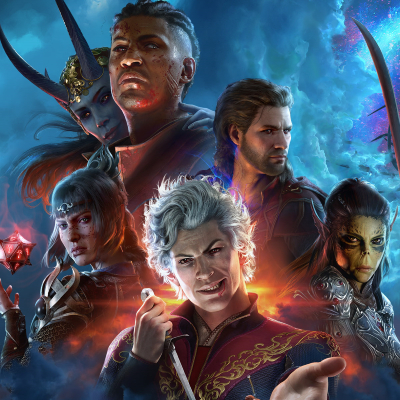
2025 games: This year’s upcoming releases
Best PC games: Our all-time favorites
Free PC games: Freebie fest
Best FPS games: Finest gunplay
Best RPGs: Grand adventures
Best co-op games: Better together







